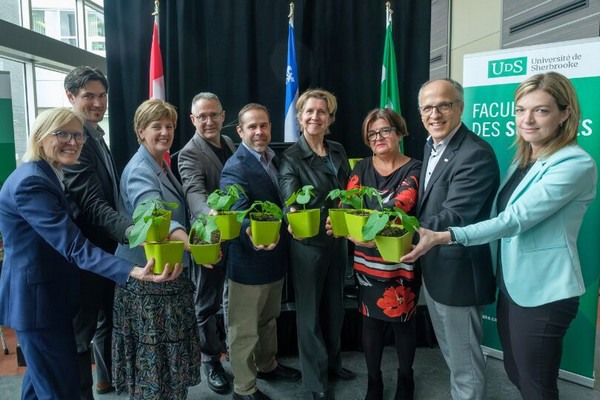On May 2, researchers from McGill University and the Université de Sherbrooke gathered alongside government officials and other guests at the Université de Sherbrooke's campus to mark the opening of a brand-new greenhouse.
The facility features a mobile laboratory and research trailer as well as an automated plant phenotyping platform that can rapidly characterize plants and study their growth. The greenhouse represents the first in a series of projects unveiled under the Eastern Canadian Plant Phenotyping Platform (ECP3), a collaborative initiative between McGill University and the Université de Sherbrooke.
 From left to right: Roseann O'Reilly Runte (Director of CFI, Government of Canada), Hugo Dionne (Québec government representative), Marie-Claude Bibeau (Minister of National Revenue and MP for Compton—Stanstead), Peter Moffett (Director of CORSÈVE), Sébastien Roy (Professor of Biology, Université de Sherbrooke), Anja Geitmann (Dean of Agricultural and Environmental Sciences, McGill), Carole Beaulieu (Dean of Science, Université de Sherbrooke), Pierre Cossette (Rector, Université de Sherbrooke), Catherine Latendresse (Head of Communications, METRO).
From left to right: Roseann O'Reilly Runte (Director of CFI, Government of Canada), Hugo Dionne (Québec government representative), Marie-Claude Bibeau (Minister of National Revenue and MP for Compton—Stanstead), Peter Moffett (Director of CORSÈVE), Sébastien Roy (Professor of Biology, Université de Sherbrooke), Anja Geitmann (Dean of Agricultural and Environmental Sciences, McGill), Carole Beaulieu (Dean of Science, Université de Sherbrooke), Pierre Cossette (Rector, Université de Sherbrooke), Catherine Latendresse (Head of Communications, METRO).
The ECP3 partnership is funded by the Canada Foundation for Innovation (CFI) with matching funding from Québec's Ministère de l'Éducation et de l'Enseignement supérieur (MEES). It is also supported by Centre SÈVE, a Québec-based research network that promotes inter-institutional, cross-disciplinary relationships between universities and government to advance knowledge in the field of plant science. The Centre SÈVE forged the connection between McGill and Université de Sherbrooke plant scientists, and their complementary expertise and desire to work together inspired the ECP3.
"Finding sustainable solutions to agricultural issues requires intentional and purposeful collaboration among leading researchers in the field," says Professor Anja Geitmann, Canada Research Chair in Biomechanics of Plant Development and lead applicant on the CFI-funded project. "We are pleased to be in partnership with our esteemed colleagues at the Université de Sherbrooke in this endeavour."
New research on the horizon
With new infrastructure and tools made possible by this grant, the ECP3 will enable researchers to accelerate the translation of plant research discoveries into applied solutions used by Canadian producers and position Canada as a global leader in the adaptation of agricultural production to rapid climate change.
Exciting ECP3 developments on the horizon at McGill University include cutting-edge plant phenomics systems, a multi-scale imaging facility, advances in genomic editing, sophisticated growth environments, and a bioinformatics tool that can more effectively collect and process large amounts of research data. The platform is designed for flexibility – allowing researchers to investigate a broad range of crop plants under diverse growth conditions.
"This new greenhouse will help facilitate plant science research aimed at preparing for and responding to climate change, water scarcity, and other major threats facing the Canadian agricultural landscape," says Professor Geitmann. "We look forward to seeing how this and future ECP3-funded advances help to further our understanding of plant species' response to their continuously-evolving environment."
Source: mcgill.ca
